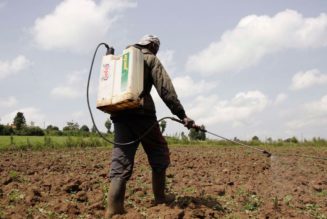Economy
Inflation holds steady at 9.2 percent in March
Friday March 31 2023
Traders selling onions at Marikiti Market in Nairobi on March 30, 2021. They source them from Nyeri, Nanyuki, Kajiado and Tanzania. PHOTO | LUCY WANJIRU | NMG
Inflation in March held steady at 9.2 percent, helped by a drop in the prices of onions and tomatoes after rains towards the end of the month.
Data from the Kenya National Bureau of Statistics (KNBS) shows that while cooking oil also recorded a drop in prices, overall, food costs rose by 13.6 percent this month compared to March 2022.
The inflation rate — a measure of the cost of living over the last 12 months — remains above the Central Bank of Kenya (CBK) target of between 2.5 and 7.5 percent.
On Wednesday, the CBK increased its lending rate to 9.5 percent from 8.75 percent, citing sustained inflationary pressures, the elevated global risks and their potential impact on the domestic economy.
Read: CBK signals costly loans after hiking rates to five-year high
High prices in the economy have been aggravated by drought, a depreciating shilling and the war in Ukraine that has disrupted global supply chains and driven up costs of key raw materials like fuel.
“The prices of cabbages, carrots and potatoes (Irish) increased by 8.9, 8.5 and 8 percent, respectively between February 2023 and March 2023. During the same period, prices of onions-leeks and bulbs, cooking oil (salad) and tomatoes decreased by 0.9, 0.7 and 0.3 percent, respectively,” said the KNBS on Friday.
Food usually has the biggest impact on the overall movement in prices because it accounts for nearly a third of the shopping basket for Kenyan families.
Transport costs remained elevated due increases in prices of petroleum products by 12.6 percent in the review period, while those of housing, water, electricity, gas and other fuels as well as household maintenance, rose by 7.5 percent.
Read: Middle class to pay Sh2.7bn more per month for power
Prices of alcoholic beverages increased by 8.7 percent, insurance and financial services (6.5 percent), recreation, sport and culture (6.2 percent), and clothing and footwear by three percent.
President William Ruto, who took power in September last year partly on a campaign platform of easing the cost of living for the majority of poor households, has ruled out short-term fixes, dropping subsidies on unga and super petrol, and instead opted to subsidise fertiliser.
→ dakure@ke.nationmedia.com









